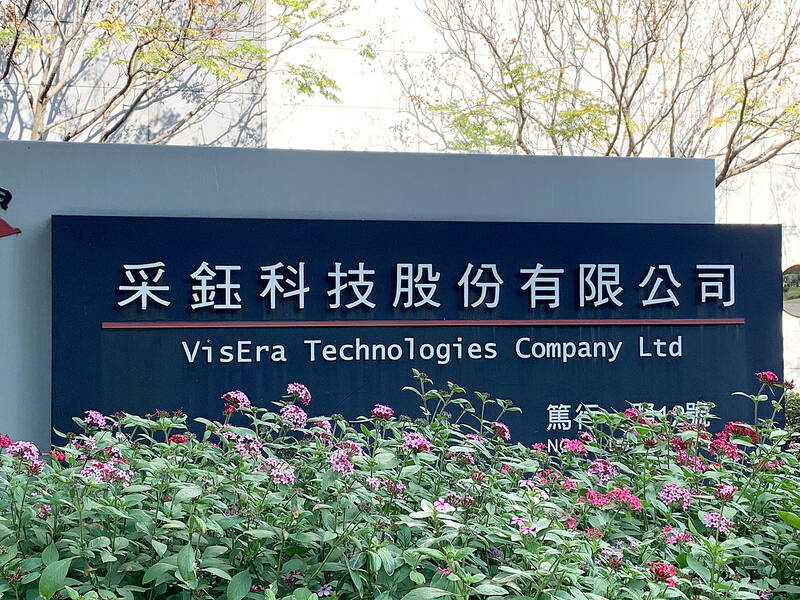Optical film packaging and CMOS image sensor (CIS) manufacturer VisEra Technologies Co (采鈺) yesterday said revenue in the first half of this year would be flat from the same period last year.
That comes as the company expects its image sensor business to remain robust in the first half thanks to the launch of new smartphone models and electric vehicle makers upgrading self-driving technology, although its sales of micro-optical elements would face more competition from rivals, VisEra said in an online earnings conference.
The company, created in 2003 as a spin-off from Taiwan Semiconductor Manufacturing Co (台積電) with investment from image sensor partners, expects revenue growth to gradually pick up steam in the second half of the year on the back of seasonal demand, it said.

Photo: Grace Hung, Taipei Times
The image sensor business accounted for 71 percent of VisEra’s revenue last quarter, while micro-optical elements made up 27 percent, company data showed.
Revenue this quarter would be lower than last quarter, as the smartphone industry has entered a slow season and national holidays cut short the number of business days, but it would still be better than the first quarter last year, VisEra chairman Robert Kuan (關欣) said.
Kuan’s remarks came after the company reported that revenue increased 43.09 percent to NT$2.69 billion (US$82 million) year-on-year last quarter from NT$1.88 billion.
On a quarterly basis, fourth-quarter revenue fell 2.18 percent from NT$2.75 billion, the company said, attributing the better-than-normal seasonal decline to customers’ stocking demand ahead of the Lunar New Year holiday and completing inventory adjustments by the end of the year.
Gross margin was 33.9 percent last quarter, down from 36.1 percent in the previous quarter, but up from 11.5 percent a year earlier, which VisEra said was primarily driven by an improved product mix and a better capacity utilization rate.
Net profit was NT$557 million and earnings per share came in at NT$1.76 last quarter, representing a fall of 3 percent from the previous quarter, but a 1,500 percent surge year-on-year, company data showed.
For the whole of last year, revenue rose 38.2 percent year-on-year to NT$10.02 billion, gross margin improved 13.7 percentage points to 30.5 percent and net profit jumped to NT$1.74 billion from NT$356 million. Earnings per share were NT$5.49, up from NT$1.13 the previous year, company data showed.
Kuan said the company’s CIS production capacity was fully loaded last year as a new plant in Taoyuan’s Longtan District (龍潭) only came on board in the second half of the year.
The company expects annual CIS output this year to be higher than last year’s level, he said.
“We expect to see an increase in high-end CIS. For example, the proportion of automotive CIS would increase this year, along with relatively good prices,” Kuan said.
“In addition, mass production of new image sensors in the second half of the year is also an opportunity to increase revenue,” he said.
VisEra plans to earmark between US$70 million and US$90 million for capital expenditure this year, higher than last year’s US$37 million, as the company aims to improve process technology, purchase new equipment, and beef up its research and development, Kuan said.

Taiwan Semiconductor Manufacturing Co (TSMC, 台積電), the world’s biggest contract chipmaker, booked its first-ever profit from its Arizona subsidiary in the first half of this year, four years after operations began, a company financial statement showed. Wholly owned by TSMC, the Arizona unit contributed NT$4.52 billion (US$150.1 million) in net profit, compared with a loss of NT$4.34 billion a year earlier, the statement showed. The company attributed the turnaround to strong market demand and high factory utilization. The Arizona unit counts Apple Inc, Nvidia Corp and Advanced Micro Devices Inc among its major customers. The firm’s first fab in Arizona began high-volume production

VOTE OF CONFIDENCE: The Japanese company is adding Intel to an investment portfolio that includes artificial intelligence linchpins Nvidia Corp and TSMC Softbank Group Corp agreed to buy US$2 billion of Intel Corp stock, a surprise deal to shore up a struggling US name while boosting its own chip ambitions. The Japanese company, which is adding Intel to an investment portfolio that includes artificial intelligence (AI) linchpins Nvidia Corp and Taiwan Semiconductor Manufacturing Co (TSMC, 台積電), is to pay US$23 a share — a small discount to Intel’s last close. Shares of the US chipmaker, which would issue new stock to Softbank, surged more than 5 percent in after-hours trading. Softbank’s stock fell as much as 5.4 percent on Tuesday in Tokyo, its

The prices of gasoline and diesel at domestic fuel stations are to rise NT$0.1 and NT$0.4 per liter this week respectively, after international crude oil prices rose last week, CPC Corp, Taiwan (台灣中油) and Formosa Petrochemical Corp (台塑石化) announced yesterday. Effective today, gasoline prices at CPC and Formosa stations are to rise to NT$27.3, NT$28.8 and NT$30.8 per liter for 92, 95 and 98-octane unleaded gasoline respectively, the companies said in separate statements. The price of premium diesel is to rise to NT$26.2 per liter at CPC stations and NT$26 at Formosa pumps, they said. The announcements came after international crude oil prices

SETBACK: Apple’s India iPhone push has been disrupted after Foxconn recalled hundreds of Chinese engineers, amid Beijing’s attempts to curb tech transfers Apple Inc assembly partner Hon Hai Precision Industry Co (鴻海精密), also known internationally as Foxconn Technology Group (富士康科技集團), has recalled about 300 Chinese engineers from a factory in India, the latest setback for the iPhone maker’s push to rapidly expand in the country. The extraction of Chinese workers from the factory of Yuzhan Technology (India) Private Ltd, a Hon Hai component unit, in southern Tamil Nadu state, is the second such move in a few months. The company has started flying in Taiwanese engineers to replace staff leaving, people familiar with the matter said, asking not to be named, as the